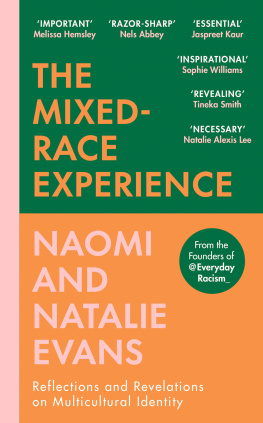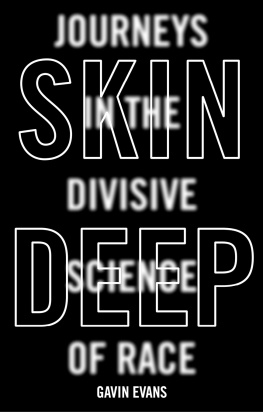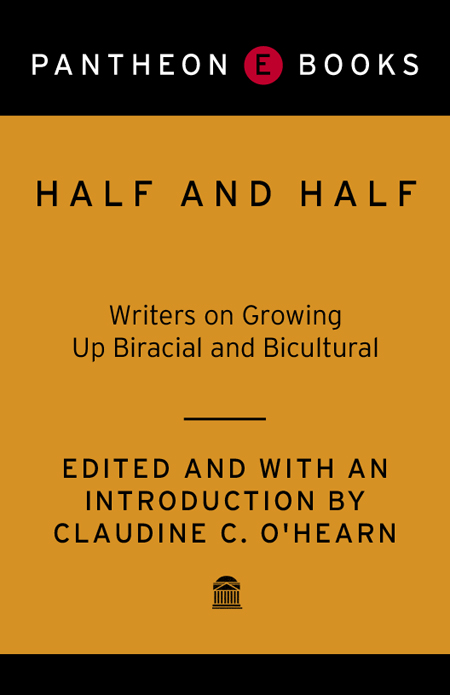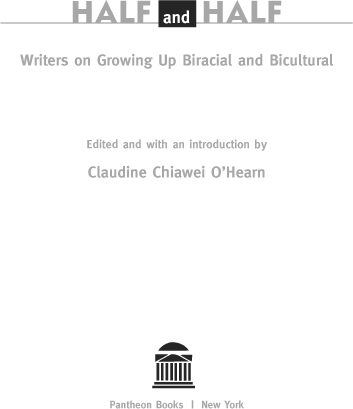INTRODUCTION
Claudine Chiawei OHearn
I was walking down the street the other day, on my way home from the gym, when a large woman with wiry hair run amok approached me, mumbling to herself and looking somewhat deranged, as only New Yorkers can look. As she neared me, she looked me in the eye and barked, Half-breed bitch. I had already passed her by the time I figured out what she had said. Shocked, my first reaction was a mix of surprise and even pleasure: Howd she know? What gave it away? It wasnt until a block later that I became enraged and thought of a witty retort.
I stopped being American when I first came to the States to live eight years ago. Growing up in Asia, I knew being mixed set me apart, but I didnt have to name it until people began to ask, Where are you from? My father was raised in a working-class Irish American family in Fall River, Massachusetts. My mother was born near Shanghai, China, but when she was seven, on the eve of the communist revolution, she and her family fled to Taiwan. They met, romantically, and I think aptly, on an airplane (my mother was a flight attendant) and soon marriedthough not without first encountering resistance. My fathers family were familiar with only stereotypes of Asian women, and so were not eager to invite China into the OHearn fold. My mothers family felt the same and took it a step further by hiring a private detective, who fortunately was unable to dig up anything incriminating about my father. Both sides eventually got over it, so we can laugh about it now, and frequently do. Following my mothers example, both of her sisters married Caucasians, creating a whole generation of hapas (Hawaiian for half) in our family.
My parents settled in Hong Kong, where I was born, and moved to Singapore, Belgium, and Ohio and finally settled in Taiwan. I consider these all to be home, with the exception of Akron, Ohio, where I experienced my first sting of racism when preschool classmates pushed me off playground slides, pulled tight their eyes, and idiotically chanted, Ching, Chang, Chong, Chinese. Early learners. As coached by my mother, I retorted, Chinese are better. But since these places are all home, they forfeit their definition as a single place I can come from. Suspended, I can go anywhere but home.
I dont look especially Chinesemy eyes are wide and lidded, and my hair has a Caucasian texture and color. When my mother and I walked together, people would stare, often rudely. I could see questions in their curious looks: Is this your daughter? We looked incongruous. It never occurred to me that my mother and I looked any more different than any other mother and daughter; and even if we did, that it would affect how we related to each other. I dont think I minded so much because I assumed that I would find a home in the States when I went there for college. To me, America was summer vacations; getting up at six in the morning to watch Scooby Doo and the rest of the Saturday morning cartoons; eating Pop Rocks and macaroni and cheese (which I would inhale in large amounts); and best of all, shopping at the mall. Coupled with what I saw in the movies, this was my small window into American life.
Because most people didnt know where to place me, I made up stories about myself. In bars, cabs, and restaurants I would try on identities with strangers I knew I would never meet again. I faked accents as I pretended to be a Hawaiian dancer, an Italian tourist, and even once a Russian student. It always amazed me what I could get away with. Being mixed inspired and gave me license to test new characters, but it also cast me as a foreigner in every setting I found myself in.
My brother looks Chinese70 percent to my 30 percent. And though he might dispute this, I have always felt that he was more readily accepted as being Chinese. I resented him for the ease with which he could slip into the culture, whereas I had to constantly prove and explain myself. I remember how during Chinese New Year, as tradition, we would go from house to house, eating large meals, playing mah jong, and collecting red envelopes containing untold amounts of cash that would later be gambled away. I dreaded these occasions because I felt excluded, whereas my brother, it seemed, was welcomed. Questions about what he planned to do with his life, when was he going to find a girlfriend, etc., were asked of him, while I was mostly treated with polite comments about the style of my dress and carted off to watch TV. Id sit in the corner, grumbling as I snacked on M&Ms and watermelon seeds and watched badly dubbed American movies. My parents were exasperated by my long face and didnt understand why I was bothered even as they had me pegged as the American one. My mother accused me of not dating Chinese guys as proof of my being Americanized. Of course when I did eventually date one, she didnt approve of him because he wore an earring, dressed all in black, and was known to smoke cigarettes. My decision to study in Ireland on a semester abroad rather than in China, a country I have yet to visit, seemed to further confirm my predilection. I defended my choice because it conveniently fit my English major and why wouldnt I want to explore my Irish heritage. Truthfully, I was afraid to go to China because it was foreign to me. This may seem absurd considering that I had been living in Taiwan for over ten years, but I knew it would require something of me that I was not prepared to give. I wasnt ready to take that journey yet. During the time I lived in Taiwan, China had seemed forbiddingI remember hearing stories about people we knew going and being detained for long periods of time. It wasnt until after I left for college that government restrictions preventing travel between the two countries were relaxed.
But then I would also benefit from the privileges of being an American. I remember how I would bypass long lines and the price of admission at nightclubs that welcomed foreigners, while my brother had to present a passport as proof of his citizenship. Even though I attended an international school, my friends fell into two groupsthe Asians and the foreigners. The biracials blended in both directions, moving between the groups, though always somewhat outside each. Looking back, I think the distinctions came more into focus as we grew older. I remember once one of my American friends let slip a racial slur, something about irreputable, gold-digging Chinese women trying to trap Western men. Appalled, I pointed to my facethe product of such unholy joinings. She responded, Oh, youre not really Chineseas though this were a plus.
When I came to the States for college, I became another sort of expatriate. Since I lacked the cultural tools necessary to roam undetected (knowledge of key television shows, important cultural references, even the subtle nuances of American English that you miss out on when you grow up abroad), I had to fake it and laugh at jokes I didnt get. Luckily I was familiar with The Simpsons, had seen almost every episode of The Love Boat on videotape, and vaguely knew who Howard Stern was. I got tired of hearing, Oh, you wouldnt understand, youre not from here.
Toward the end of my first year, I went to hear Angela Davis speak. In making a point about the racism and inequality of the American educational system, she asked the white students to raise their hands if they had taken a course in black/Asian/etc. studies. A few proud students lifted their arms, and I was one of them. Then she asked the students of color to raise their hands if they had taken a course that focused on white/Western studies. Every one of them raised their hands, and the point was made. One was made for me as well, for I had hesitated, unsure whether to join them, although I wasnt sure why I assumed I belonged to the first group any more than the second. I ended up raising my hand for both, looking around to see if anyone noticed. I realized that although I had been making a point all year of letting people know that I was Chinese and enjoyed surprising them, I had learned to believe that I was American/whiteI didnt differentiate. Could I be both, or did one trump the other?





